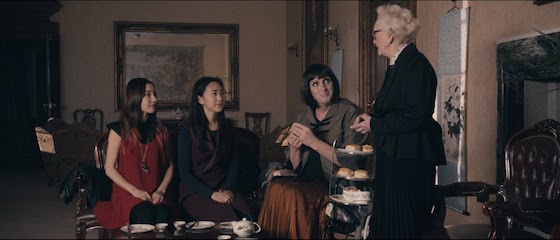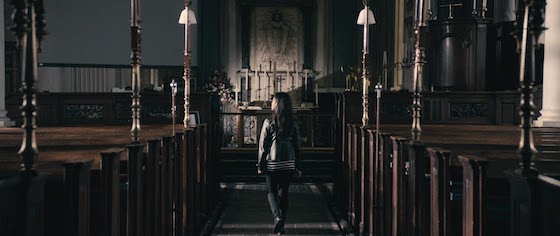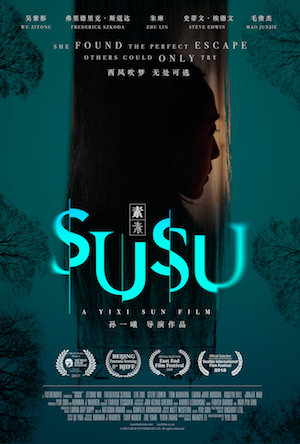[Rating: Rock Fist Way Down]
Unfocused, schizophrenic, and crippled by a pedestrian narrative whose twists any 10-year-old could see coming from a mile away, Susu takes a big swing and misses so hard that it ends up hitting itself. A sort of post-modern Gothic horror, this debut feature by Yixi Sun fails in just about every way a movie can (acting, directing, writing, cinematography: you name it). Indeed, perhaps the only real achievement of Susu is its ability to pull off that rarest of cinematic feats: it starts awful, yet still manages to get exponentially worse in scene after scene.
Susu opens in 1990, with the apparent suicide of a Chinese woman in a large English estate. After a second (disposable?) opening scene, the movie jumps ahead 28 years to modern day London, where it introduces the audience to two Chinese students/roommates, Qi’an (Zitong Wu) and Aimo (Zhu Lin). The more studious Qi-an lines up a weekend job in the country to do some translation work, and not wanting to be left behind, Aimo tags along. Yet even before the pair get to the ominous mansion in the middle of nowhere, things appear off with Qi’an.
Squirrely, paranoid, and prone to nightmares, Qi’an is set up early on as a young woman with demons lurking in her past. Using this already spooked person as the film’s lead is a curious choice, as it takes the wind out of the sails of the narrative, which revolves around the countryside mansion and the secrets lurking within. It would be like if Jack arrived at the Overlook Hotel in The Shining in mid-murder spree.
 Once Qi’an and Aimo arrive at the hotel, the mistress of the house, Shirley (Steve Edwin), explains that her family possesses a massive stockpile of old film prints, cameras, and costumes. A centerpiece of this collection is the home recordings of Chinese Kunqu Opera star Susu (Junjie Mao), which Qi’an and Aimo are tasked with translating and transcribing. Everything is just a little bit off at the mansion, however, from Shirley and her neighbor/maid, to the overall vibe of the place, which the film tries and largely-fails to establish as askew.
Once Qi’an and Aimo arrive at the hotel, the mistress of the house, Shirley (Steve Edwin), explains that her family possesses a massive stockpile of old film prints, cameras, and costumes. A centerpiece of this collection is the home recordings of Chinese Kunqu Opera star Susu (Junjie Mao), which Qi’an and Aimo are tasked with translating and transcribing. Everything is just a little bit off at the mansion, however, from Shirley and her neighbor/maid, to the overall vibe of the place, which the film tries and largely-fails to establish as askew.
To help with this, a new character is introduced in the second act, a scholar by the name of Joia (Roslyn Hill). Joia’s presence at the mansion is a strange detour, rooted primarily in plot exposition and as an attempt to physically thrust menace into the narrative. She is a lazy character/plot device that’s nonetheless necessary since the script isn’t pushing the story in a manageable direction. It also chaffs against Qi’an and her mysterious backstory, one that’s peppered throughout the picture, yet tends to ebb and flow out of the narrative when stop-gap measures like Joia appear.
In short, it’s all a mess. Narratively, Susu is like a broken vase taped back together. The rough form of something resembling a coherent story is here, but many of the pieces are mixed up and forced into the wrong place. This starts with the characters, who have little consistency and only exist in this film to connect the dots of the scattershot plot. Qi’an is jumpy and prone to the jitters early in the movie, yet when Aimo expresses her reservations about the mansion, and how she thinks it is haunted, Qi’an brushes it off. This is the same person that was literally afraid of her own shadow in the first handful of minutes, yet from moment to moment, her attitude, motivations, and bearing seem to have no relation to each other.
 Script-wise, this thing is a shambles, and can’t even manage the basic task of keeping its own story straight. Susu died 28 years ago…or was it 20, as Joia says? Characters explode into scenes out of nowhere and disappear just as fast: the plot-fuel character of Dirk Cain (Tom Mannion) a repeat offender of this script sin. The acting ranges from amateurish at best, to ham-fisted at worst: the film’s lead (Wu) sadly left out to dry in this regard. To her credit, Wu isn’t given a lot to work with, and has to carry the weight of a script that doesn’t know what it wants to do from minute to minute, yet she also isn’t doing herself a lot of favors.
Script-wise, this thing is a shambles, and can’t even manage the basic task of keeping its own story straight. Susu died 28 years ago…or was it 20, as Joia says? Characters explode into scenes out of nowhere and disappear just as fast: the plot-fuel character of Dirk Cain (Tom Mannion) a repeat offender of this script sin. The acting ranges from amateurish at best, to ham-fisted at worst: the film’s lead (Wu) sadly left out to dry in this regard. To her credit, Wu isn’t given a lot to work with, and has to carry the weight of a script that doesn’t know what it wants to do from minute to minute, yet she also isn’t doing herself a lot of favors.
Structurally and visually, there’s also a lot of groping around in the dark, here. This movie’s use of cuts and the earnest longing in its selection of shots is Wiseau-level bad, and hints at a director that doesn’t know how to speak visually. Attempts are made to use striking imagery and set-pieces to dramatic effect, like taking a shower with one’s clothes on, yet it is handled with such clumsy and misguided intentions as to come off as laughable. Like, when Vesper Lynd does this in Casino Royale, it makes sense dramatically because she just helped murder a man, not trip in the garden, as is the case in Susu.
So, yeah, this one is hot garbage. Hampered by characters that don’t make a lot of sense, a story that is a predictable, convoluted mess, and acting that wouldn’t pass muster in a traveling U.S.O. company, Susu does just about everything wrong. Playing at the Seattle International Film Festival this week, Susu su-sucks.







Comments on this entry are closed.